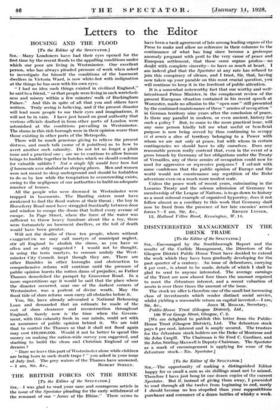THE BRITISH FORCES ON THE RHINE
[To the Editor of the SPECTATOR.]
Sin,--! was glad to read your sane and courageous article in the issue of the Spectator pleading for the early withdrawal of- the remnant of our Army of the Rhine." There seems to
have been a tacit agreement of late among leading organs of the Press to make and allow no reference in their columns to the continuance of what has long since become a grotesque anomaly pregnant with peril to the very cause of peace and European settlement, that these same organs profess—no doubt with complete sincerity—to have so much at heart. i am indeed glad that the Spectator at any rate has refused to join this conspiracy of silence, and I trust, Sir, that, having now taken up your parable on this most crucial question, you will continue to keep it in the forefront of public attention.
. It is a somewhat noteworthy fact that our wOrthy and well- intentioned Prime Minister, in the complacent review, of the present European situation contained in his recent speech at Worcester, made no allusion to the "open sore" still presented by the continued maintenance of these " armies of occupation" in German territory nine years after the conclusion of peace. Is there any parallel in modern, or even ancient, history for such a policy ? But, to come to the more practical issue, will any sane person kindly tell me what useful or beneficial purpose is now being served by thus continuing to occupy vi et armis a slice of territory belonging to a Power with whom we are not only at peace, but with whom in certain contingencies we should have to ally ourselves. Does any reasonable person really contend that, even in the event of a gross breach by Germany of her obligations under the Treaty of Versailles, any of these armies of occupation could now be used for aggressive or repressive purposes ? I submit with some confidence that the public opinion of Europe and the world would not countenance any repetition of the Ruhr adventure even on a much more modest scale.
Unless the peace work of recent years, culminating in the Locarno Treaty and the solemn admission of Germany to membership of the League of Nations, is to go down to history as a most colossal example of organized hypocrisy, does it not follow almost as a corollary to this work that Germany shall now be freed from the presence of her late enemies' armed


































 Previous page
Previous page